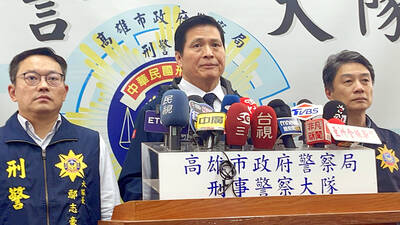Perry Link, the sinologist who in 2002 coined the metaphor “the anaconda in the chandelier” to describe the Chinese Communist Party (CCP), revisited the idea in a talk earlier this month in Taipei.
During a talk at Academia Sinica on Sept. 12, he shared how he first came up with the idea to describe the CCP’s censorship of Chinese society as like “a giant anaconda coiled in an overhead chandelier.”
Speaking in Chinese, Link said that “the inception of the idea first came with my subjective feeling of uneasiness when talking to CCP officials, as it was not easy to speak my mind freely.”

Photo: Reuters
In the 2002 article first published in the New York Review of Books, Link wrote: “[The anaconda] feels no need to be clear about its prohibitions. Its constant, silent message is: ‘You yourself decide,’ after which, more often than not, every one in its shadow makes his or her large and small adjustments all quite naturally.”
First, it is “fear-induced self-censorship,” which becomes “naturalized,” he said.
“The red line is left intentionally vague, as the less one knows, the more they would self-censor,” he added.
He joked that being blacklisted by the Chinese government granted him more freedom to speak about the CCP.
He described his situation using a Chinese phrase: “Dead pigs are not afraid of boiling water.”
“The US media likes to interview me as they know I do not self-censor,” he said.
Link said he was blacklisted by the CCP in 1996, but the authorities never informed him why, an example of the anaconda metaphor, he said.
He said that Chinese people are constantly surveilled and have a “divided consciousness.”
“Lashing out at the leaders at night when drunk and changing gear to another set of language during daytime,” Link said. “Everyone has two lives.”
“This kind of divided consciousness becomes fossilized... and people gradually do not know the true value of being human,” he said.
Link said it is problematic that many Chinese say living in a tech-aided surveillance society is “safe.”
“Can we as human beings really be okay with being surveilled 24/7?” he asked, saying he believes it is against human nature.
A long-time China watcher and researcher, Link is a distinguished professor of comparative literature and Chinese at The University of California, Riverside. He helped Fang Lizhi (方勵之), a Chinese democrat and dissident, leave China after the Tiananmen Square Massacre in 1989.
Link also translated Charter 08, a citizens’ manifesto calling for constitutional democracy in China co-authored in 2008 by prominent dissident Liu Xiaobo (劉曉波), who was later awarded the Nobel Peace Prize in 2010 and died in 2017 after repeated arrests in China.

Twenty-four Republican members of the US House of Representatives yesterday introduced a concurrent resolution calling on the US government to abolish the “one China” policy and restore formal diplomatic relations with Taiwan. Led by US representatives Tom Tiffany and Scott Perry, the resolution calls for not only re-establishing formal relations, but also urges the US Trade Representative to negotiate a free-trade agreement (FTA) with Taiwan and for US officials to advocate for Taiwan’s full membership in the UN and other international organizations. In a news release announcing the resolution, Tiffany, who represents a Wisconsin district, called the “one China” policy “outdated, counterproductive

Actress Barbie Hsu (徐熙媛) has “returned home” to Taiwan, and there are no plans to hold a funeral for the TV star who died in Japan from influenza- induced pneumonia, her family said in a statement Wednesday night. The statement was released after local media outlets reported that Barbie Hsu’s ashes were brought back Taiwan on board a private jet, which arrived at Taipei Songshan Airport around 3 p.m. on Wednesday. To the reporters waiting at the airport, the statement issued by the family read “[we] appreciate friends working in the media for waiting in the cold weather.” “She has safely returned home.

ON PAROLE: The 73-year-old suspect has a criminal record of rape committed when he was serving in the military, as well as robbery and theft, police said The Kaohsiung District Court yesterday approved the detention of a 73-year-old man for allegedly murdering three women. The suspect, surnamed Chang (張), was arrested on Wednesday evening in connection with the death of a 71-year-old woman surnamed Chao (趙). The Kaohsiung City Police Department yesterday also unveiled the identities of two other possible victims in the serial killing case, a 75-year-old woman surnamed Huang (黃), the suspect’s sister-in-law, and a 75-year-old woman surnamed Chang (張), who is not related to the suspect. The case came to light when Chao disappeared after taking the suspect back to his residence on Sunday. Police, upon reviewing CCTV

TRUMP ERA: The change has sparked speculation on whether it was related to the new US president’s plan to dismiss more than 1,000 Joe Biden-era appointees The US government has declined to comment on a post that indicated the departure of Laura Rosenberger as chair of the American Institute in Taiwan (AIT). Neither the US Department of State nor the AIT has responded to the Central News Agency’s questions on the matter, after Rosenberger was listed as a former chair on the AIT’s official Web site, with her tenure marked as 2023 to this year. US officials have said previously that they usually do not comment on personnel changes within the government. Rosenberger was appointed head of the AIT in 2023, during the administration of former US president Joe